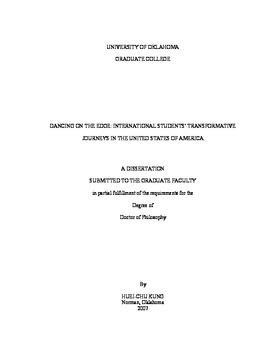| dc.contributor.advisor | Karpiak, Irene E., | en_US |
| dc.contributor.author | Kung, Huei-chu. | en_US |
| dc.date.accessioned | 2013-08-16T12:20:52Z | |
| dc.date.available | 2013-08-16T12:20:52Z | |
| dc.date.issued | 2007 | en_US |
| dc.identifier.uri | https://hdl.handle.net/11244/1239 | |
| dc.description.abstract | This study explored international students' experiences of studying in the United States, including the motives that brought them to the United States, the challenges they confronted, and the learning and development opportunities that arose. The theoretical framework of the study was embedded in theories of adult learning and development, chaos and complexity, and transformative learning. The qualitative methodology aimed to gain an understanding of the lived experiences of these international students, and to capture and represent their meaning making and their learning journeys. Data were collected primarily from two in-depth interviews with eighteen participants, and analyzed qualitatively following the guidelines of interpretivism. | en_US |
| dc.description.abstract | The findings revealed that the journeys of these participants studying in the United States comprised a process of cultural crossing, in which four major themes were identified that, in turn, addressed the research questions. These included seizing opportunities to determine their destinies, confronting difficulties and disequilibrium, navigating between home and host cultures, and being and becoming authentic. The major elements that contributed to these participants' adjustment and success were their personal capacities, relationships with others including their new living environments, and their capabilities to engage in transformative learning. Out of the research findings, a conceptual schema of being and becoming was introduced to capture these participants' change and growth during the process of cultural crossing. | en_US |
| dc.description.abstract | Implications and recommendations arising from this study include the need for: (1) American universities to undertake further research, conduct needs assessments, and provide cultural learning training programs; (2) staff, faculty members, and classmates to perform active listening and share their know-how with international students; (3) international students to befriend others, form learning communities, and open themselves to learning. Finally, researching the corresponding impacts, challenges, and difficulties that American counterparts may experience while interacting with international students may further contribute to both domestic and international students' change and growth. Confronting challenges and difficulties leads these participants to dance on the edge of disequilibrium and re-equilibrium in a foreign land; however, their lives and the lives of those around them will never be the same. | en_US |
| dc.format.extent | xii, 219 leaves : | en_US |
| dc.subject | Education, Higher. | en_US |
| dc.subject | Students, Foreign United States Psychology. | en_US |
| dc.subject | Students, Foreign United States Social conditions. | en_US |
| dc.subject | Education, Bilingual and Multicultural. | en_US |
| dc.subject | Education, Adult and Continuing. | en_US |
| dc.title | Dancing on the edge: International students' transformative journeys in the United States of America. | en_US |
| dc.type | Thesis | en_US |
| dc.thesis.degree | Ph.D. | en_US |
| dc.thesis.degreeDiscipline | Department of Educational Leadership and Policy Studies | en_US |
| dc.note | Adviser: Irene E. Karpiak. | en_US |
| dc.note | Source: Dissertation Abstracts International, Volume: 68-06, Section: A, page: 2356. | en_US |
| ou.identifier | (UMI)AAI3271223 | en_US |
| ou.group | Jeannine Rainbolt College of Education::Department of Educational Leadership and Policy Studies | |
